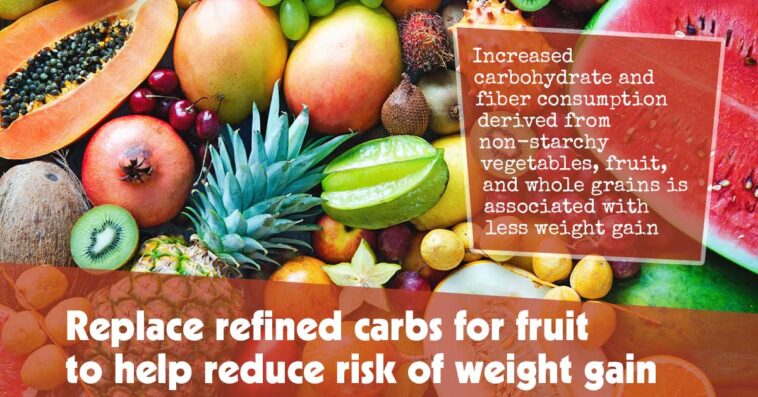Swap Refined Carbs with Fruit to Lower the Risk of Weight Gain
An extensive study suggests that high carb consumption from sugary drinks, starchy vegetables and refined grains is linked with greater midlife weight gain; conversely, increasing carb and fiber intake from non-starchy vegetables, fruit and whole grains was associated with less weight gain.
Studies found that associations were stronger for individuals with higher body weight, underscoring the significance of carbohydrates as sources and quality for long-term weight management.
Carbohydrate consumption’s influence on weight gain and obesity remains contentious, and only limited research has explored any correlation between changing consumption of carbs over time and long-term body weight changes.
To investigate further, these associations were monitored at intervals of 4 years over 24 years of observation.
Results were drawn from data obtained from 136,432 women and men 65 years or younger who took part in the Health Professionals Follow-Up Study and Nurses’ Health Studies 1 and 2, among which are participants of Health Professionals Follow-Up Study, Nurses’ Health Study 1 and 2.
At enrollment, all individuals were free of chronic kidney disease, gastric issues, neurodegenerative disorders, respiratory illness, cardiovascular diseases, cancers or diabetes.
At the start of the study, questionnaires were completed regarding lifestyle factors, medical history, personal characteristics and other elements affecting health; then every two to four years for subsequent years.
Results indicate that individuals on average gained 1.5 kg every four years over 24 years – an 8.8-kg gain in total.
Studies conducted with both men and women indicate a correlation between increases in glycemic index/load increases (which measure how certain foods affect blood sugar levels) and subsequent weight gain.
One study linked an increase of 100 grams a day in added sugar or starch to between 0.9 kg and 1.5 kg more weight gain over four years; conversely, an increase of 10 grams per day in fiber was linked with less weight gain;
Increased carb consumption from fruit, whole grains, and non-starchy vegetables such as spinach, carrots and broccoli was linked with less weight gain.
On the other hand, higher consumption of refined grains and starchy vegetables like potatoes, corn and peas was associated with greater weight gain.
Analysis revealed that substituting carbohydrates derived from sugar-sweetened beverages, starchy vegetables and refined grains with equivalent quantities from non-starchy vegetables, fruit and whole grains resulted in decreased weight gain.
Associations were stronger among individuals with excess body weight compared to individuals of normal weight; most of these associations were also more evident among women.
As this was an observational study, causal relationships cannot be established; and some limitations included participants self-reporting estimated carb consumption estimates and weight results; as well as potential dietary measurement errors.
This study employed frequent nutritional evaluations and validated questionnaires over an extended follow-up period that included significant midlife weight gain.
